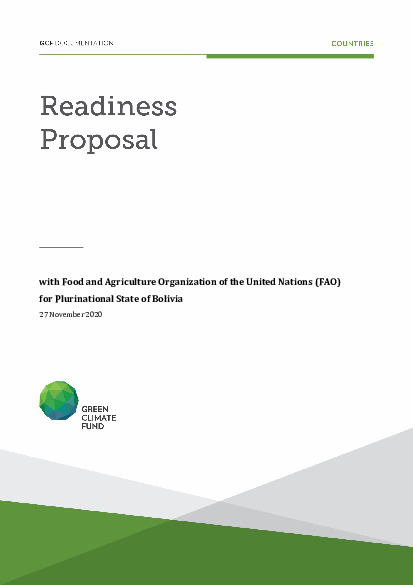Capacity Building to Monitor the Agriculture, Forest and Other Land-Use Sector in the National Determined Contributions, and enhancement of Climate Finance Access in the Plurinational State of Bolivia

Capacity Building to Monitor the Agriculture, Forest and Other Land-Use Sector in the National Determined Contributions, and enhancement of Climate Finance Access in the Plurinational State of Bolivia
The Plurinational State of Bolivia is highly vulnerable to climate change, generating and exacerbating droughts, floods and other events that jeopardize the food security of communities and producers that depend on agriculture activities, systems of agroforestry, forest managements, among other economic activities that maintain family economy of the five ecoregions of Bolivia: Amazon, Chiquitanía, Altiplano (or Andean Plateau), Chaco and Valles.
According to IPPC projections, global warming due to climate change is most likely to cross the 2oC barrier by the end of the 21st century. Therefore, surface and groundwater sources highly vulnerable to the impacts of climate change could decrease. Moreover, fire hotspots and forest fires could be more frequent as well as desertification and degradation of soils.
Under these considerations, the Plurinational State of Bolivia has presented its Nationally Determined Contributions (NDC) within the framework of the Paris Agreement of 2015, ratified by Bolivia through Law No835 of September 2016.
The Mother Earth Plurinational Authority (APMT) is the government body in charge of implementing climate change policies and of Bolivia's compliance towards the commitments to the UNFCCC. It is also in charge of the review of Bolivia's NDCs within the framework of the Paris Agreement.
Bolivia has set several goals related to forest and agriculture landscapes, water and energy in the NDCs. However, up to date, an integrated system for monitoring, reviewing and verifying forest and agriculture landscapes, as well as water targets, has not been developed to meet such commitments. The established baseline regarding the agriculture, forest and other land-use sector (AFOLU) would enable strategic and operational decision-making processes aimed at facilitating the effective implementation, completion and delivery of the Country Programme results. An integrated system is also essential to provide institutionalized and articulated actions that would contribute to the implementation of the NDCs and the climate change national public agenda, which also includes social and environmental safeguards.
The main objective of this readiness proposal is to develop capacities in both the APMT and the NDA to strengthen the monitoring and reporting process of the international climate change commitments and enhance the access to climate finance with evidence-based proposals aligned to the National Country Programme. Request is made to the GCF to achieve the following results:
- Institutional Capacities in Climate Change Management developed. To strengthen the capacities and awareness-raising procedures of the NDA and other government institutions to access climate funding. Technical guidelines must be defined, as well as a coordination mechanism platform, and a procedure to assess the needs in climate funding management. A list of national entities to be accredited to the GCF will also be formulated.
- Strategic Frameworks on Climate Change Issues and Public-private Funding Strategy developed. To assess and complete the Country Programme and strengthen the Information and Monitoring Systems of forest, water use rights and protected areas, and articulate them into an integrated Information and Monitoring System ̈Big Data-Forests, Water, Soils, Biodiversity and Environmental Functions ̈ within the framework of the State's Comprehensive Planning System (SPIE). Develop a public-private funding strategy for the technical and financial sustainability of forest, water, soil and biodiversity management activities.
- Exchange of experiences and knowledge/learning process for climate action implementation. To exchange experiences and knowledge in the design of public policies, standards and methodologies on carbon neutrality in forest areas, and on climate funding management with both public and private funds.